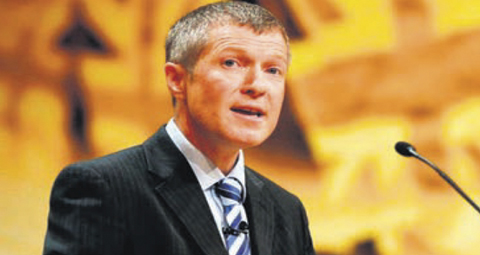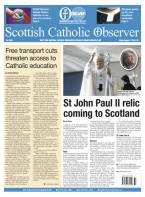BY Liz Leydon | March 27 | ![]() 0 COMMENTS
0 COMMENTS ![]() print
print

Lib Dems aim to find the middle ground
Scottish Lib Dem leader Willie Rennie believes his party and Catholics have a great deal in common, SCO editor LIZ LEYDON finds out in the latest in her series of interviews with Scottish party leaders ahead of the general election
Visiting Willie Rennie’s office in the Scottish Parliament is like peeking behind the scenes at a prestigious theatre for a privileged glimpse at all the hard work, and hard workers, it takes to get the show on the road.
Glancing at the Scottish constituencies, it is easy to overlook the fact that the Liberal Democrats have been in government at Westminster since 2010, albeit in coalition with the Conservatives. Scottish Lib Dem leader Willie Rennie, the former MP for Dunfermline and West Fife (2006-2011) and current MSP for Mid-Scotland and Fife region, is well placed to offer insight into the relationship between Holyrood and Westminster and, for that matter, the relationships between the major UK political parties.
“Religion played a big part in my life growing up,” he said of his grandfather’s ministry and his parents’ involvement in the Church of Scotland. “I do not go to Church now but those values stay with you. Politics is now my way of expressing the same desire for change.”
So close to the May 7 general election, the Scottish Lib Dem leader’s relaxed, welcoming demeanour is a pleasant surprise, as is his ability to share insight and anecdotes. Yet this grandson of a Church of Scotland minister knows there are some tough questions ahead.
Freedom
Mr Rennie believes the ability to put yourself in someone else’s shoes is important and that basic human emotion of understanding others is key to life and to the modern Scottish and UK political landscapes.
“The Liberal Party is all about the freedom to express your own views,” Mr Rennie said when discussing issues of conscience surrounding abortion and assisted suicide. “Freedom of conscience [for the medical professionals] already exists under the 1967 Abortion Act. Recent challenges to that, such as the Glasgow midwives, raises the issue of how far away it extends from procedures. Where do you draw the line? Taken to the furthest extreme, you would have to exclude everyone.”
He backs the line drawn last December by the Supreme Court on conscience over abortion, and also supports the recent decision not to devolve abortion to the Scottish Parliament now, but reserve to look at it again in the future.
“When it comes to abortion, a health and ethics issue, it can all depend on the way you slice it,” he said. “It is a hot political issue prompting fiery debate. We took the view to accept the decision of the Smith Commission.”
When it comes to assisted suicide, like many of his fellow party leaders—excluding Partick Harvie of the Greens—Mr Rennie is concerned.
“I am not convinced the safeguarding is in place to be able to process with assisted suicide in Scotland,” he said. “You can always draw an example of someone who should be permitted to end their life but it is not a black and white issue. It is those on the edges we must stay aware of. Communities and society must not be allowed to exert pressure, or suggest that somebody has passed their usefulness. Then there is the danger of some exploiting others.”
And while he said that other members of his party may not agree, he himself has nothing but respect for fellow Liberal party member Gordon Macdonald of Care Not Killing Scotland’s viewpoint and work.
“Gordon is a good example of how you can mix politically the professional and the personal,” he said. UK issues On the issue of the UK’s nuclear defence, Mr Rennie is clear: “I want nuclear disarmament as quickly as possible,” he said. “But that cannot be done unilaterally.”
He believes that keeping a small nuclear deterrent in the short-term is important to keep the UK in international nuclear disarmament negotiations. He suggest plans to renew the submarines that carry the UK nuclear arsenal raise the issue of huge costs in austere times, but said that the Liberals are keen to look at reducing from four to three submarines and ‘are prepared to take the consequences’ as to how that would impact treaties, agreements and quotas.
A former MP involved in Home Rule, Mr Rennie is uniquely placed to talk about the working relationship between Holyrood and Westminster. The issue of same-sex marriage legislation brings this sharply into focus.
“I am in favour of same-sex marriage,” he said. “I think marriage is a great institution and we should share it as widely as possible.”
He spoke about the need for the UK Government to change equality legislation to protect for individual celebrants in Scotland from being forced to perform same-sex marriage against their beliefs as an example of Holyrood working with the Westminster. “Protecting the freedom of both sides is a very Liberal policy,” he said.
Education and sectarianism
Mr Rennie acknowledges the quality of Catholic state education in Scotland, but also sees problems with a two-tier state education system.
“The standard of education in Catholic schools, the ethos, the sense of community is something to emulate throughout the Scottish education system,” he said. “The number of non-Catholic parents wishing to send their children to our Catholic schools proves that.
“I think Catholic schools do a pretty good job. Would I have started from where we are at now? No, the whole two-pronged education situation in Scotland isn’t ideal. But the Church made a great contribution to Scottish society, often at times when the state could not. This has left us with a mixed education system. But if it works, why change it?”
He thinks Scotland has bigger issues to tackle than perceived difficulties of Catholic and non denominational schools. Another problem he spoke about was sectarianism, which he called ‘a deep-rooted cultural issue’ in our society. Like many in opposition to the Nationalist Scottish Government, he sees the Offensive Behaviour at Football and Threatening Communications (Scotland) Act 2012 as a product of the ‘something needs to appear to be done’ school. “Opposing this bill does not mean we are in favour of sectarianism,” he said. “There were already laws in place, however. We did not need this additional law.” He spoke on the need for ongoing work in schools and workplaces to educate and tackle religious bigotry.
“Sectarianism remains a big problem and we must keep working on it,” he said. “Football plays a part, clubs working together, as do the police working within communities.” Future of Scotland.
In addition to the Liberal Democrats’ goals of keeping the political debate in the centre, avoiding swings to the right and the left, and keeping the UK Together, Mr Rennie told the SCO of his own vision of Scotland.
“I am in favour of building up, not breaking up the UK,” he said on the subject of Scottish independence. “I am also in favour of more powers coming to Scotland as part of the UK.” Among the powers he suggests is the installation of Scotland’s own welfare state and the ability to make decisions in Scotland on the money we spend.
“Can we work with the SNP Government, of course,” he said. “And other parties? We have been part of the Coalition Government for the past five years.”
There are things he would change as Scotland changes. “It breaks my heart to see a young child—at 2, 3 or 4 years of age—in difficult home circumstances who I just know isn’t going to get the same opportunities as children from different backgrounds,” he said. “Good quality education from an early age is the route out of poverty,” he said, adding that poverty, the environment and living within our means were key concerns when looking at sustaining society.
Conclusion
One of the achievements Mr Rennie is most proud of is, as an MP, closing a loophole in the law that allowed sexual predators to prey on young people learning to drive.
“It led to enhanced background checks for instructors, and thanks to the bravery of my constituents, we were able to make a real difference,” he said.
Mr Rennie believes the Liberal Democrats and those of faith have a great deal in common. “Issues such as the selflessness of international development are at the forefront of what we are about,” he said. “People of faith are attracted to that.”
Whether Catholic voters will find common ground with the Liberal Democrats in this general election, or future elections, remains to be seen as issues and tactics come into play before May 7 and ahead of other ballots. The question remains: Can the Lib Dems make a difference or will support for the party be lost in the shuffle?











